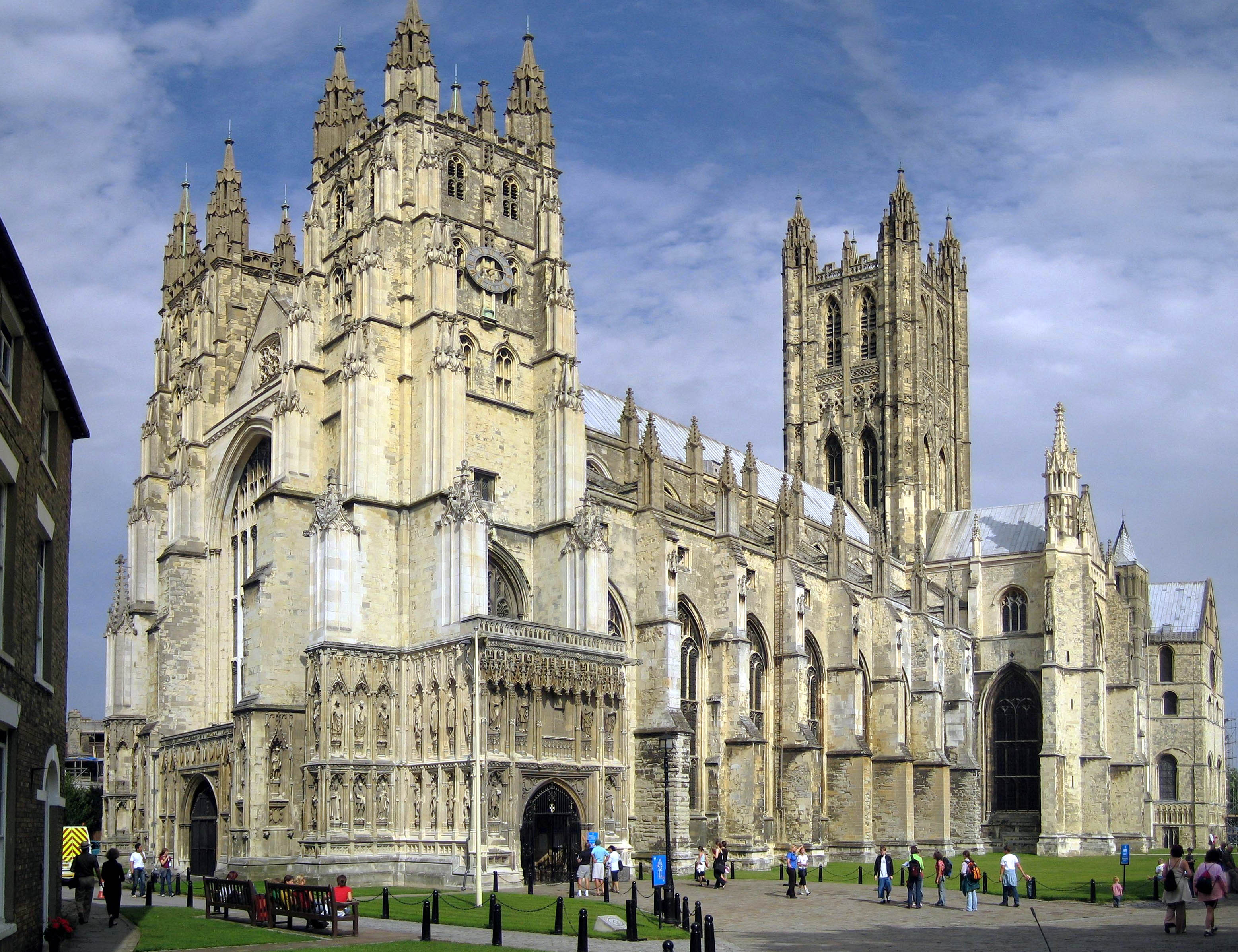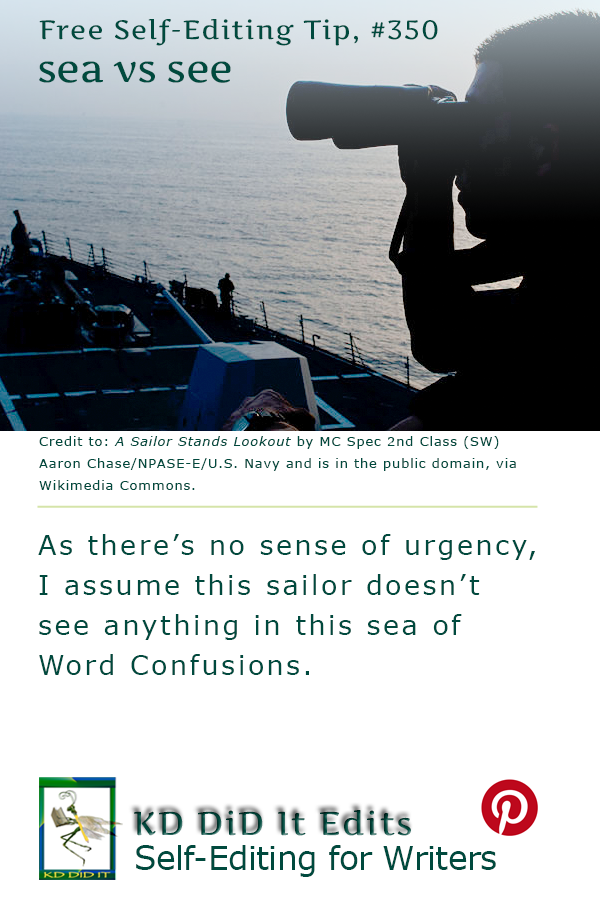Revised as of
11 July 2023
Okay, the only possible explanation for this word confusion, sea versus see, has to be a reliance upon spellcheck. Otherwise I cannot possibly believe that a writer can become confused by sea or see.
Word Confusions . . .
. . . started as my way of dealing with a professional frustration with properly spelled words that were out of context in manuscripts I was editing as well as books I was reviewing. It evolved into a sharing of information with y’all. I’m hoping you’ll share with us words that have been a bête noire for you from either end.
If you found this post on “Sea versus See” interesting, consider subscribing to KD Did It, if you’d like to track this post for future updates.
| Sea | See |
|---|---|

The Gulf of Tunis at Dusk by Paul SKG (originally posted to Flickr as P1010746) is under the CC-BY-SA-2.0 license, via Wikimedia Commons. — Looking out over the sea in Tunisia. |

Canterbury Cathedral Portal Nave Cross-spire by Hans Musil is under the CC BY 2.0 license, via Wikimedia Commons. — The west front, nave, and central tower of Canterbury Cathedral as seen from the south. |
| Part of Grammar: | |
| Adjective; Noun
Plural for the noun: seas |
Noun 1; Verb 2, intransitive & transitive Plural for the noun: sees Third person present verb: sees |
| Adjective: Of, pertaining to, or adapted for use at sea Noun: Expanse of salt water that covers most of the earth’s surface and surrounds its landmasses
|
Noun: Introductory signal an author uses to notify the reader that there are other places in the book, paper, report, etc., where more information can be found 1 The place in which a cathedral church stands, identified as the seat of authority of a bishop or archbishop Verb, intransitive:
[see to] Attend to
Ensure Verb, transitive:
Discern or deduce mentally after reflection or from information
Meet someone one knows socially or by chance
Escort or conduct someone to a specified place [In poker or brag] Equal the bet of an opponent |
| Examples: | |
| Adjective: I do adore a sea view. We’re going on a sea voyage. Noun: We looked out on rocky bays lapped by a vivid blue sea. About one-third of Europe drains into the Black Sea. The Sea of Galilee is one of the earliest settled areas in Israel. There was still some sea running. The lifeboat met seas of thirty-five feet head-on. She scanned the sea of faces for Stephen. |
Noun: “See” is used to indicate additional information is many nonfiction books. The Holy See is the central government of the Roman Catholic Church. Canterbury Cathedral is the see for the archbishop of Canterbury. Verb, intransitive: I can’t see into the future. I’ll see to Dad’s tea. Lucy will see to it that everyone got enough to eat and drink. See that no harm comes to him. Verb, transitive: I see from your appraisal report that you have asked for training. I went to see King Lear at the Old Vic. See Alaska in style. Elements are usually classified as metals or nonmetals (see chapter 11). I shall not live to see it. I can’t bear to see you so unhappy. The 1970s saw the beginning of a technological revolution. They see their rights being taken away. I don’t know what I see in you. I can’t see any other way to treat it. I saw that perhaps he was right. I’ll go along to the club and see if I can get a game. He saw himself as a good teacher. I can’t see him earning any more anywhere else. It has to be the answer, don’t you see? See, I told you I’d come. I’s seeing Caroline. I saw Colin last night. Some guy she was seeing was messing her around. You may need to see a solicitor. The doctor will see you now. Don’t bother seeing me out. I’ll see your twenty and raise you another five. |
| Derivatives: | |
| Adjective: seaborne, seafaring, seagoing, seaworthy Noun: seabed, seabird, seaboard, seacock, seafood, seagrass, seahorse, seaworthiness |
Adjective: seeable, unseeable Noun: seeableness, seafarer, seafront |
| Phrasal Verb | |
| see about see after see off see out see over see someone off see someone out see someone through see something of see something out see something through see through see to |
|
| History of the Word: | |
| Crystal’s Spell It Out notes that these two words were once pronounced differently | |
| Old English sǣ, of Germanic origin and related to the Dutch zee and the German See. |
|
C’mon, get it out of your system, bitch, whine, moan . . . which words are your pet peeves? Also, please note that I try to be as accurate as I can, but mistakes happen or I miss something. Email me if you find errors, so I can fix them . . . and we’ll all benefit!
Satisfy your curiosity about other Word Confusions on its homepage or more generally explore the index of self-editing posts. You may also want to explore Book Layout & Formatting Ideas, Formatting Tips, Grammar Explanations, Linguistics, Publishing Tips, the Properly Punctuated, Writing Ideas and Resources, and Working Your Website.
Resources for Sea versus See
Apple Dictionary.com
Dictionary.com: sea
Pinterest Photo Credits
A Sailor Stands Lookout was photographed by Mass Communication Specialist 2nd Class (SW) Aaron Chase/NPASE-E/U.S. Navy and is from the official US Navy page in the public domain, via Wikimedia Commons.


